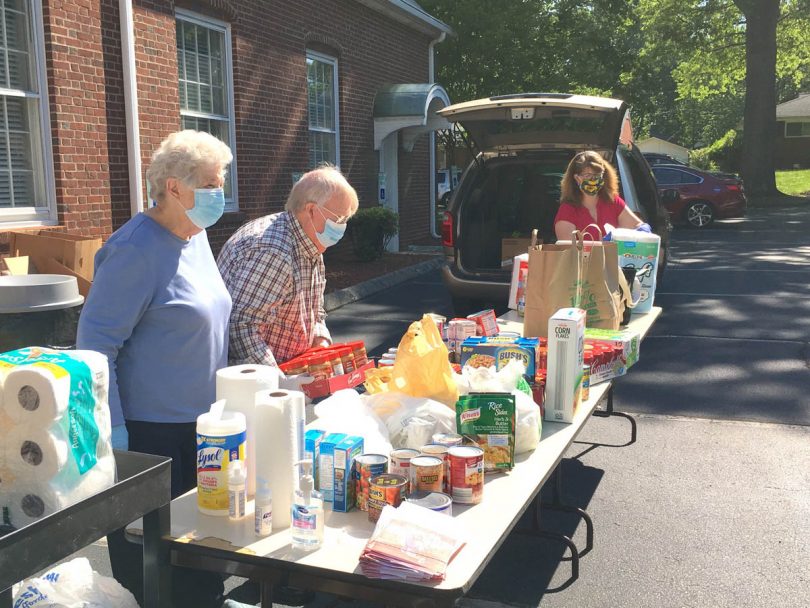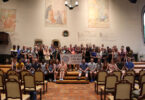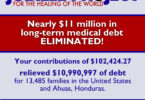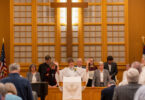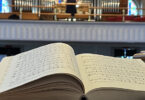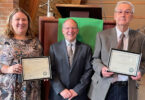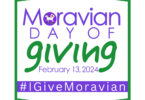The Rev. John D. Rights, pastor of Konnoak Hills Moravian Church in Winston-Salem, N.C., shared this illustration of how his congregation responded during the deepest days of the stay-at-home orders surrounding COVID-19.
How will we as a congregation stay connected while complying with stay-at-home orders? During these months of distancing, what can we do to maintain the weekly rhythm of Sunday? In these days of pandemic disruption, what difference can we make as Christ continues his call for us to be neighbors?
For the Konnoak Hills congregation in Winston-Salem, the answers to these questions converge in a weekly food collection for the Sunnyside Ministry of the Moravian Church. At 10:00 each Sunday morning, the church bell rings over the neighborhood. For the next two hours, members, friends and neighbors drive in bags and boxes of groceries during our customary Sunday school and worship times.
![]() This was our weekly worship. A bulletin is offered with announcements and a brief, printed message. Some weeks, a ten-person-six-feet-apart band plays. Other weeks, we hear very nice guitar music and songs. Each week, we collect an offering of food averaging 400 pounds pulled from car trunks, pickup beds and backseats. Oak Grove Moravian, Come and Worship, Bethania Moravian, Calvary Moravian, and Konnoak Hills United Methodist Congregations have also contributed. Some people pass monetary gifts through a window. A Moravian couple in Pennsylvania heard about the collections and paid forward a government stimulus check by mail.
This was our weekly worship. A bulletin is offered with announcements and a brief, printed message. Some weeks, a ten-person-six-feet-apart band plays. Other weeks, we hear very nice guitar music and songs. Each week, we collect an offering of food averaging 400 pounds pulled from car trunks, pickup beds and backseats. Oak Grove Moravian, Come and Worship, Bethania Moravian, Calvary Moravian, and Konnoak Hills United Methodist Congregations have also contributed. Some people pass monetary gifts through a window. A Moravian couple in Pennsylvania heard about the collections and paid forward a government stimulus check by mail.
The zip code shared by Sunnyside Ministry and Konnoak Hills falls within North Carolina’s fifth most economically depressed urban area. In these weeks, food requests increased by more than 70 percent at Sunnyside. Our donations join with others to provide 250 family food orders a week.
It’s especially uplifting to see how our neighbors respond:
“Let us know what you’ll need. We’ll try to pick up some more things at the store this week.”
“We used to be members at another church, but we don’t go anywhere now. We come here on Christmas Eve with my mother-in-law. We’re coming to see you.”
“Thanks for doing this. Are you going to ring the church bell on Easter morning?” We rang the bell on Easter morning.
During the Great Depression, Gardner Taylor served as the pastor of a small, rural church in Louisiana. A single light bulb hanging from the ceiling illuminated the sanctuary. One night, in the middle of his sermon, the electricity failed. The room went pitch black. Taylor fumbled around, not really knowing what to do.
“Preach on, preacher! The shout came from the back of the room. Preach on! We can still see Jesus in the dark!”
![]() In the darkness of these days, someone described what we’re doing as “preaching without words.” Within the parameters of stay-at-home orders, we have lost neither our ability nor our desire to “preach on.” So we “preach,” and we pray, and we believe, and we stay connected as best we can, because that’s what we do. Even in the darkness, we still see Jesus and preach on, using words if necessary. n
In the darkness of these days, someone described what we’re doing as “preaching without words.” Within the parameters of stay-at-home orders, we have lost neither our ability nor our desire to “preach on.” So we “preach,” and we pray, and we believe, and we stay connected as best we can, because that’s what we do. Even in the darkness, we still see Jesus and preach on, using words if necessary. n

